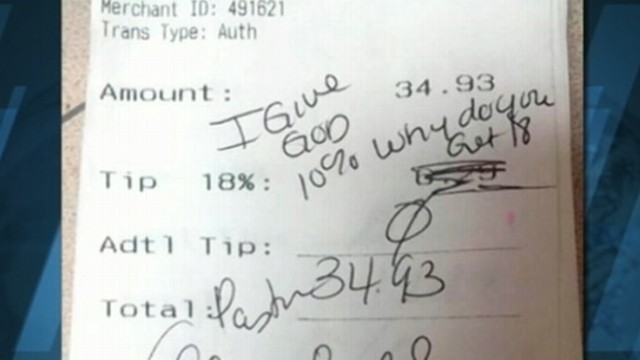Here’s a nice storm in a crisis teacup underlining the importance of organisations having a clear social media policy AND clarity in your crisis media statements.
Last week, the pastor of an American church in St. Louis went with her congregation to a restaurant, part of a chain, called Applebee’s. The receipt for the meal added an 18% tip which is restaurant policy for parties of eight or more. While the 18% tip was paid by the party, the Pastor, Alois Bell, crossed out the 18%, scribbled: “I give God 10% why do you get 18?”, and left no tip herself (although subsequently claimed to have left $6 cash on the table).
An employee at the Applebee’s restaurant took a picture of the receipt and posted it to Reddit where it went viral.
The image shown above has been cropped but the original picture posted to Reddit showed the pastor’s signature. The woman who shared the picture (and was not the same person who served Bell and her party) was fired by the franchisee running that branch of Applebee’s and a routine press release issued:
“Our Guests’ personal information – including their meal check – is private, and neither Applebee’s nor its franchisees have a right to share this information publicly. We value our Guests’ trust above all else. Our franchisee has apologized to the Guest and has taken disciplinary action with the Team Member for violating their Guest’s right to privacy. This individual is no longer employed by the franchisee.”
Cue social media outrage that the employee had been fired when the guest’s behaviour was widely considered to be rude which was then picked up by traditional media (e.g. ABC News). As the criticism mounted, the former employee claimed that she didn’t break any specific guidelines in the company handbook and that Applebee’s would rather lose a dedicated employee than lose an angry customer.
Only then did Applebee’s President, Mike Archer, issue a (well written) statement sharing a portion of the company’s social media policy, which expressly forbids employees from breaching customer privacy without permission from an executive. He added: “I recognize that you may still disagree with the decision, but I hope this may have provided some additional insight”.
If the specific guidance from the privacy and social media policy had been shared at the start of the issue and the first statement had maybe used a few more personal pronouns (“you, our guest’s privacy”), I suspect that this would have been nipped in the bud. But in treating the issue as a ‘business as usual’ type incident rather than thinking through the negatives and forestalling them, Applebee’s has had to waste time and resources all weekend fighting an unnecessary PR fire.

